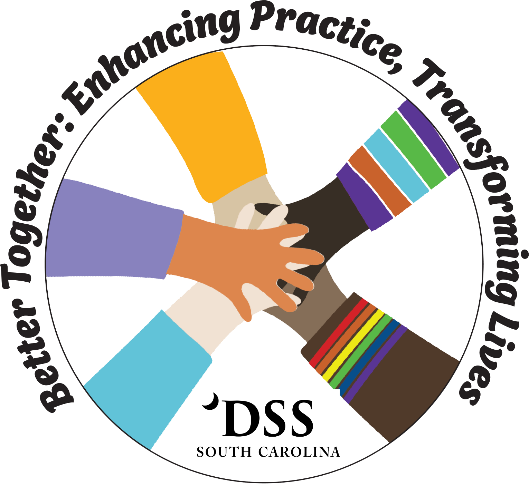What is Family Engagement?
Family Engagement means developing a successful working relationship through honesty, respect, empathy, and active listening.
> Listening to families and recognizing strengths and needs.
> Being non-judgmental and meeting families where they are.
> Understanding the role of the family’s culture.
> Facilitating the creation of a child and family team.
> Including the child, immediate family, and extended family in the case-planning and decision-making process.
> Child and family voice is paramount!
Family Engagement means partnering with families that are involved with DSS to work toward what is best for children and to make it easier for the people who love them to come together and help develop a plan for their care. Child and Family Team Meetings are an essential tool for effective family engagement.
What is a Child and Family Team Meeting?
A Child and Family Team meeting is a gathering of family members and other invested stakeholders who join together to build on family strengths to ensure the child’s safety, permanency, and well-being. Child and Family Team Meetings are family-driven, culturally-responsive, goal-orientated and problem-solving processes where families make decisions about the care and protection of their children through the development of their Family Permanency Plan.
Who attends a Child and Family Team Meeting?
A Child and Family team is comprised of the family, kin, fictive kin, supports (ie. pastor, friend, teacher) and other invested stakeholders that the family identifies. The team also includes the DSS case manager and other professionals (therapist, Department of Mental Health, Department of Juvenile Justice).
Where do Child and Family Team Meetings take place?
Due to social distancing restrictions during the pandemic, Child and Family Team Meetings are being facilitated through Microsoft Teams. Microsoft Teams allows participants to join by video or by phone to engage in the meeting.
Why does the department conduct Child and Family Team Meetings?
SCDSS believes Teaming will increase the department’s ability to support and improve care to children and families, build relationships with community partners, and ultimately, increase safety and permanency for children.
What are the benefits of Child and Family Team Meetings?
- Improves likelihood of keeping families together at home & decreases out of home care
- Reduces length of time in foster care and leads to more stable living arrangements
- Improves engagement of the non-custodial parent and their family, creating additional resources.
- Leads to more creative, detailed and complete plans for children and families.
- Improves the likelihood of resolving complicated cases.
- Maintains important family bonds and increases family reconnections.
- Reduces length of time children & families are involved in systems.
- Draws on family strengths and resources, builds protective capacity.
- Improves relationships between families and the agency.
Child and Family Team Meeting Resources:

